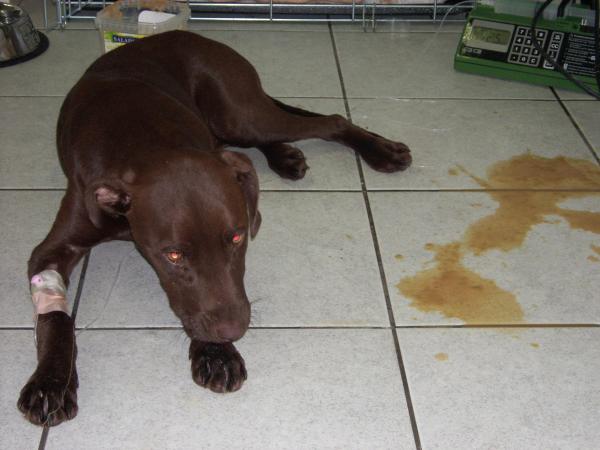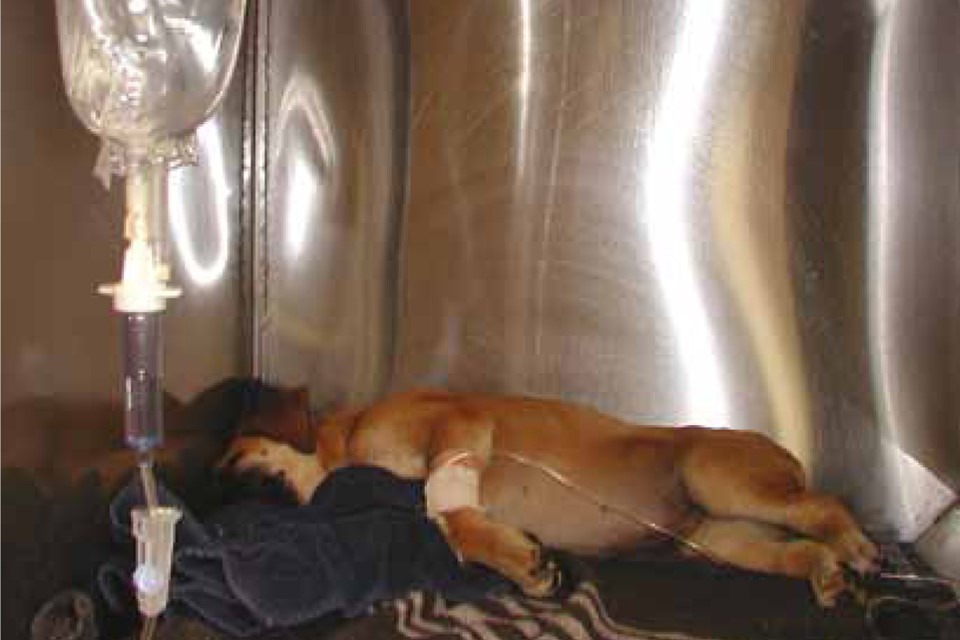Enteritis in Your dog is a condition that involves inflammation of the small intestine and stomach. It often occurs concurrently with gastritis or inflammation of the stomach.
The most common signs of small intestinal and stomach diseases include diarrhea and vomiting. Fever, abdominal pain, and lethargy may be present, and a dog’s appetite is often diminished while ill. Young puppies and unvaccinated dogs are more likely to develop infections with preventable diseases such as parvovirus.
Diagnosing gastroenteritis in dogs can be difficult, particularly if it is caused by a viral infection. The first step of diagnosis is examining the dog to determine their hydration, pain, and abnormalities during abdominal palpation, changes in the rectal exam, and body temperature. Based upon any exam findings as well as any notable changes in a dog’s recent history, testing is performed.

There are many causes of small intestinal inflammation in dogs. One reason is that it often occurs after a dog eats something unhealthy, such as rotten food after getting into the trash.
Some cases of enteritis are caused by bacteria, such as Clostridial enteritis, Salmonellosis, Campylobacteriosis; viral such as Parvovirus, Rotavirus, Coronavirus or parasitic infections like Roundworm, hookworm, Coccidiosis. intestinal obstruction may cause enteritis. Also, extreme fear, stress, or anxiety can result in enteritis in dogs. Physical obstruction of the stomach or small intestine with foreign material can lead to inflammation within the gastrointestinal tract.
This a condition caused by infection or irritation of the intestines can lead to diarrhea and weight loss. A sudden case of enteritis may occur after contracting an infectious disease, such as parvo, or a virus. Chronic cases of enteritis can cause weight loss, anemia, and malnutrition.
Table of Contents
Signs and symptoms
*Fever * Weight loss
*Vomiting * Poor nutrition
*Diarrhea * Stooling
* Abdominal pain * Lethargy
Treatment plan
Any dog with an intestinal infection should be considered ill. Depending on the cause, recovery can take days to weeks. Occasionally dogs will die, especially if younger than six months of age. All ages of dogs can develop diseases such as parvovirus or coronavirus; the death rate is higher in very young and very old dogs.

Some cases of enteritis will resolve on their own. If your dog has diarrhea for a day or two, he may just need fluids to replace what he lost through vomiting and diarrhea. Left untreated, enteritis can sometimes be fatal in dogs.
Pets with frequent or intermittent vomiting, severe diarrhea, vomiting or diarrhea lasting more than one or two days, lethargy, or loss of appetite should go for an evaluation. When it comes to veterinary medicine, one of the most common health issues that dogs experience is gastric upset.
A well-balanced diet will help your dog to return back to normal life. Antibiotics are used to treat bacterial gastroenteritis and prevent secondary infections in pets with suppressed immune systems due to viral infection; parasitic infections are treated with dewormers. Bacterial infection requires antibiotics.
In most cases, some kind of supportive care will be needed. Dogs should also be monitored for any development.
How to Prevent Enteritis
In order to prevent parvo and other serious viruses that lead to enteritis, you should be sure your dog is current on all recommended vaccinations. Furthermore, administer monthly worm prevention and flea control treatment. Also, keep food and trash out of reach of your dog. If possible, keep your dog on a leash to prevent exposure to harmful substances or contaminated water.
If your dogs develop enteritis, early treatment is the key. Do not ignore signs of enteritis in your dog. Be sure to see a veterinarian to examine and recommend the best medication for your dog.





